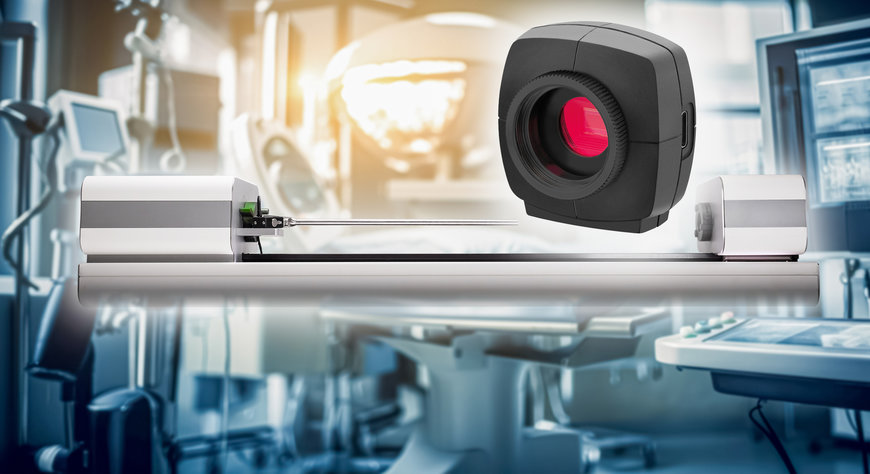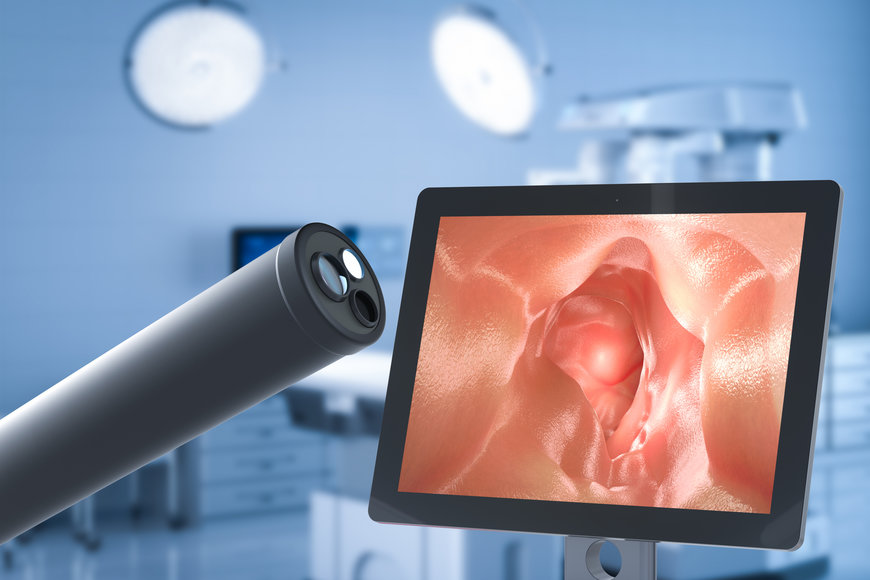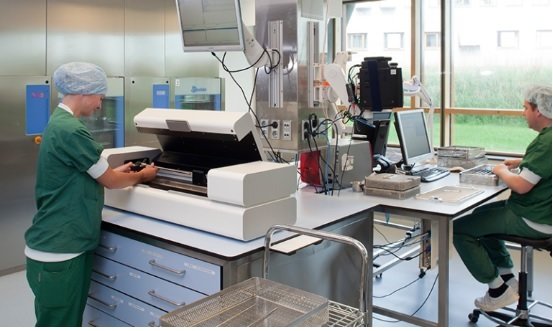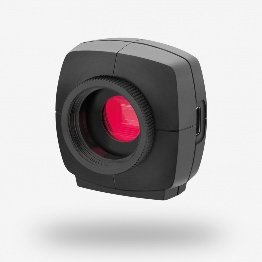www.magazine-industry-usa.com
31
'23
Written on Modified on
A reliable eye on health
Automatic visual inspection of rigid endoscopes.

Rigid endoscopes are used in medical diagnostics and therapy to examine body cavities and hollow organs and to perform minimally invasive procedures. In order to avoid risks for patients and medical staff, it is essential that the devices function perfectly. Reliable quality testing is intended above all to exclude risks from infections and injuries, but also misdiagnoses. In many countries, hospitals are required by law to regularly check and maintain their endoscopes to ensure that they function properly and do not contain any germs that are harmful to health. In addition, there are European guidelines and standards that regulate the quality assurance of rigid endoscopes. These checks are carried out by specially trained staff and include endoscopy tests and sterilization tests as well as extensive visual inspections.
The Dutch company Dovideq Medical Systems B.V. specializes in measuring instruments for minimally invasive surgery. The current product range is aimed at central sterilization departments in hospitals, endoscope manufacturers and endoscope repair companies. For the inspection of rigid endoscopes, Dovideq Medical Systems has developed various automated and networked systems. Particularly handy, small, light, cost effective and fast is the automatic endoscope tester LightControl. Using six test and measurement parameters, detailed data on the condition of the endoscope is recorded and evaluated. This ensures that only flawless endoscopes reach the operating theatre.
The LightControl system ensures a high degree of efficiency and reliability with the help of IDS cameras from the LE camera family. For the safety of all, for the well-being of the patients and ultimately also for the benefit of the hospital balance sheet.
The COVID 19 pandemic has brought the importance of hygiene and sterility of endoscopes and other medical devices even more to the fore, leading to a greater awareness of the need for automated inspection procedures. An endoscope that has not been properly cleaned and disinfected can cause the transmission of infection, and a defective endoscope can lead to injury during patient examination or treatment. No less serious are the consequences of a misdiagnosis or incorrect treatment if an endoscope does not function properly or is damaged, resulting in incorrect images.

Quality defects and the associated impaired functioning of an endoscope can have various origins. In addition to incorrect handling and lack of maintenance, these include factors such as material fatigue and contamination. Improper transport or unsuitable storage can also lead to damage, as can the simple ageing of the medical device. Lenses and other optical components can wear out over time, resulting in blurred or distorted images. To prevent bacteria or other pathogens from settling on the endoscope and thus not only impairing the quality of the images but, in the worst case, also harming the person being treated, they are regularly sterilized. However, the sterilization process can also affect the quality and accuracy of medical devices, as the high temperatures and chemical substances used in the process can be potentially harmful to the sensitive components of the endoscope. In particular, heat and steam can trap moisture in the lenses and cause damage. In addition, some sterilizing substances, such as formaldehyde, can have a corrosive effect on metal parts.
As complex as the possible causes are, as versatile are the possible damages of an endoscope. In order to efficiently deal with the complexity of the required inspection criteria, Dovideq Medical Systems has developed the patended LightControl visual inspection system. “With the help of the camera, it sees far more than the human eye of a surgeon, for example dirt particles, lens fractures, impurities or colour deviations,” explains Chielant de Wit, Managing Director of Dovideq Medical Systems.

LightControl runs the automated visual inspection with the aid of a uEye LE camera from IDS. Price, sensor and size were decisive factors in the choice of model. The built-in USB3 Vision industrial camera U3-3860LE Rev.1.2 is reduced to essential functions and has a light-sensitive Sony sensor. The integrated IMX290 with BSI technology (“back-side-illumination") ensures excellent image quality with clean colour separation and enables true-to-life reproduction of the subject, which is so important here - even under poor or fluctuating lighting conditions. The camera is small and versatile; the lightweight, coated plastic housing is nevertheless robust. This makes it ideal for integration into small devices and embedded systems and predestines it for use in medical technology.
For the automated quality inspection of endoscopes, Dovideq has identified six test and measurement parameters that the camera examines and about whose status the system provides detailed feedback in real time:
-The "Lens Fracture" algorithm measures whether one or more internal lenses have a fracture. The "Particle Detection" algorithm finds out whether fine dirt particles, moist or other contaminations have entered the internal areas of the endoscope. For both measurements, the camera takes several pictures and makes a histogram from them. The system references the images in relation to previous images and feeds this data into a neural network.
-“Light fibers” are measured in lux and are based on light emission. The light fiber measurement uses reference values to ensure that the fibers or fiber bundles of the endoscope allow enough light to pass through. This prevents the endoscope from providing unclear images.
-The "light transmission" through the lenses is determined on the basis of individual images from the integrated IDS camera. For this purpose, the measuring device uses a calibrated light source that falls on a pixel plane. Each pixel is assigned a specific RGB value of a colour spectrum. The combination of all pixels is converted into a luminance value and referenced with the help of a specially developed algorithm.
-The "focus measurement" uses the scientific Harr wavelet transformation to check whether the lenses are intact and not contaminated or whether the endoscope provides a clear image. During the measurement, the system takes several pictures to get an idea of the condition of each lens. In the optimal case, the camera looks through the endoscope and shows sharp contours.
-“Colour Correction" is performed to detect discolouration due to the sterilisation process. The system warns against misinterpretation of images due to colour deviations. The unit takes images and measures deviations in colour transmission using the HSV model, which describes the colour of a pixel based on the 3 values Hue (hue), Saturation (saturation) and Value (brightness). Colour Correctness ensures that the actual colours of organs or tissues are reproduced to avoid incorrect diagnosis or treatment.
"With the help of the test and measurement details, information about the performance of the tested endoscopes can be evaluated and history and trend analyses can be created," explains Chielant de Wit. "LightControl stores all details of the endoscope measurements, together with the test results, in a database called EndoscopeManager for reporting and management purposes, enabling dedicated management and quality reporting."

Handling on the example of the ScopeControl® product
According to Chielant de Wit, the customer benefits are obvious. "The automated visual inspection of endoscopes serves quality assurance, efficiency, cost-effectiveness and patient safety in hospitals and medical practices. Systems like LightControl make a significant contribution to this by providing objective results and detecting even the smallest defects, scratches or wear on endoscopes. Moreover, they always work with the same accuracy and consistency, regardless of factors such as fatigue or human error, and are much faster. This saves time and costs, leads to higher equipment availability and improved resource utilisation. Potential defects or damage are detected at an early stage, which can avoid costly repairs or replacement of endoscopes. The resulting images or videos are available as proof of inspection and can be used for fault analysis and training purposes if required.
Outlook
"Endoscopes are vital medical devices that enable doctors to diagnose and treat a variety of conditions by providing a clear, internal view of a patient's body. However, like any medical device, endoscopes are subject to wear and tear, and over time they may need to be repaired or replaced", says Chielant de Wit. Already now, the demand for automated intelligent visual inspection of endoscopes is high and is expected to increase further in the coming years. In particular, due to the increasing number of endoscopy procedures and the growing sensitivity to infection risks, the demand for automated inspection technologies will become stronger. In addition, artificial intelligence will help improve the efficiency and accuracy of inspection processes and minimise human error.
The needs of the health sector are evolving as fast as the technologies used in this field. The use of IDS cameras is increasingly proving its worth here. "In medical technology, the demand for our products has increased particularly in the past year, which pleases us not only from an economic point of view," explains IDS Managing Director Jan Hartmann. More and more IDS cameras are thus making a contribution to health promotion worldwide.

Camera
Our cost- and space-saving project camera: The uEye LE
-Interface: USB 3
-Model: U3-3860LE-C-HQ Rev.1.2
-Sensor type: CMOS
-Manufacturer: Sony
-Frame rate: 135 fps
-Resolution: 1936 x 1096 px
-Shutter: Rolling-Shutter
-Optical class: 1/3"
-Resolution: 1,31 MPixel
-Dimensions: 47,0 x 46,0 x 23,9 mm
-Weight: 36 g
-Connector: USB Type-C
-Applications: Machine Vision, Medical technology and Laboratory automation, Inspection application
Client
Dovideq Medical Systems specializes in measuring instruments used in minimally invasive surgery. The current product range is aimed at central sterilisation and biomedical engineering departments, as well as professional hospital OR managers concerned with endoscope use and quality. Dovideq solutions lower total cost of ownership, reduce surgery downtime and increase efficiency, predictability and traceability by automating key processes, including repairs.

